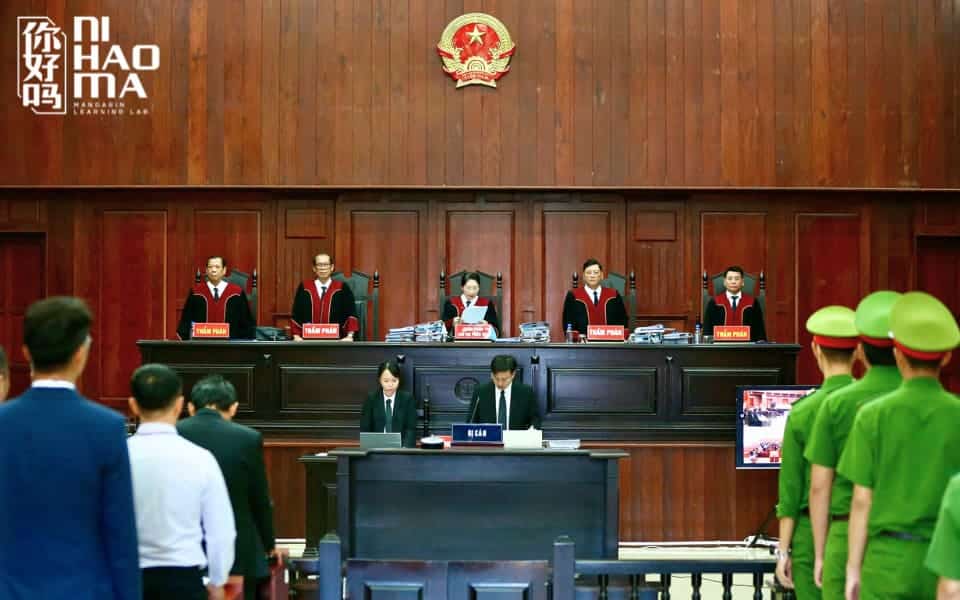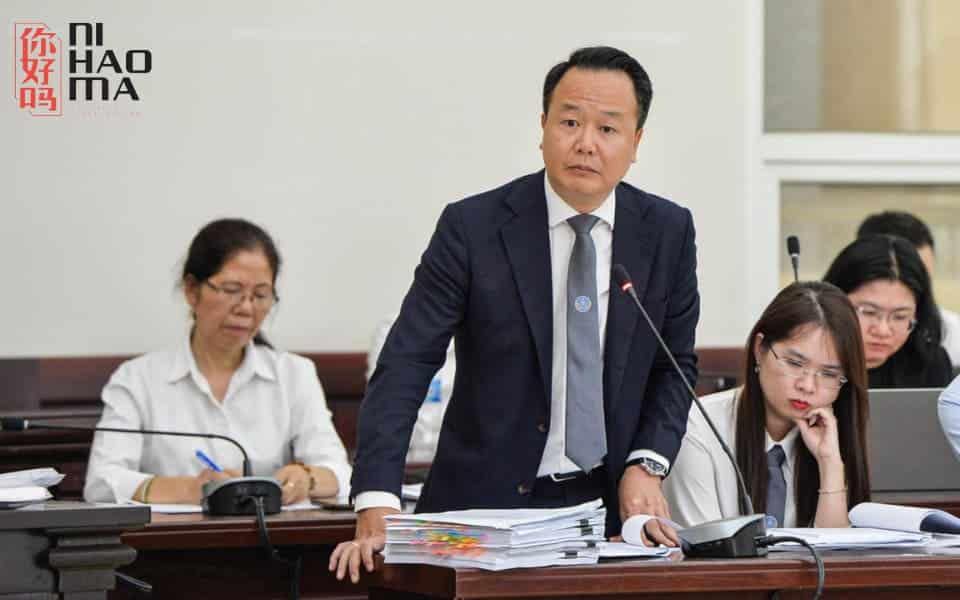Are you looking for a comprehensive resource for legal terms in Chinese? Learning Chinese legal vocabulary is not only useful for law students but also essential for business professionals, import-export staff, or anyone working with Chinese partners. Explore this collection of specialized legal terms in Chinese and sample dialogues to expand your vocabulary and improve your communication skills!
Legal Terms in Chinese
Mastering legal terms in Chinese helps you understand China’s legal system more clearly and gives you a significant advantage in both academic and professional settings. This specialized vocabulary is especially valuable for those studying law, business, or aiming to work in an international environment. Let’s take a look at the most common legal terms in Chinese.

Legal Terms in Chinese: Different Codes of Law
A country’s legal system usually consists of various codes, ranging from civil and criminal law to commercial law. Each code has its own features and functions, creating a complete legal framework. These laws not only define the rights and obligations of citizens but also establish fundamental principles for state governance and international relations.
| Chinese | Pinyin | Meaning |
|---|---|---|
| 法律 | fǎlǜ | Law / Legal system |
| 宪法 | xiànfǎ | Constitution |
| 刑法 | xíngfǎ | Criminal law |
| 民法 | mínfǎ | Civil law |
| 行政法 | xíngzhèng fǎ | Administrative law |
| 婚姻与家庭法 | hūnyīn yǔ jiātíng fǎ | Marriage and family law |
| 劳动法 | láodòng fǎ | Labor law |
| 知识产权法 | zhīshì chǎnquán fǎ | Intellectual property law |
| 公司法 | gōngsī fǎ | Corporate law |
| 破产法 | pòchǎn fǎ | Bankruptcy law |
| 继承法 | jìchéng fǎ | Inheritance law |
| 诉讼法 | sùsòng fǎ | Procedural law |
| 经济法 | jīngjì fǎ | Economic law |
| 环保法 | huánbǎo fǎ | Environmental protection law |
| 海商法 | hǎishāng fǎ | Maritime law |
| 司法 | sīfǎ | Judiciary / Judicial system |
| 立法 | lìfǎ | Legislation |
| 专利法 | zhuānlì fǎ | Patent law |
| 贸易法 | màoyì fǎ | Trade law |
| 证券法 | zhèngquàn fǎ | Securities law |
| 土地法 | tǔdì fǎ | Land law |
| 网络安全法 | wǎngluò ānquán fǎ | Cybersecurity law |
| 国家安全法 | guójiā ānquán fǎ | National security law |
| 投资法 | tóuzī fǎ | Investment law |
| 海关法 | hǎiguān fǎ | Customs law |
| 反腐败法 | fǎnfǔbài fǎ | Anti-corruption law |
| 交通规则 | jiāotōng guīzé | Traffic regulations |

Chinese Legal Vocabulary: Crimes and Punishments
When watching movies or reading news about criminal cases, we often encounter terms like “murder,” “fraud,” or punishments such as “death penalty” and “life imprisonment.” Mastering these legal terms in Chinese not only helps you better understand current events but also provides a solid foundation for learning about China’s legal system.
| Chinese | Pinyin | Meaning |
|---|---|---|
| 杀人罪 | shārén zuì | Murder |
| 盗窃罪 | dàoqiè zuì | Theft |
| 抢劫罪 | qiǎngjié zuì | Robbery |
| 贪污罪 | tānwū zuì | Corruption |
| 受贿罪 | shòuhuì zuì | Bribery (receiving) |
| 行贿罪 | xínghuì zuì | Bribery (giving) |
| 诈骗罪 | zhàpiàn zuì | Fraud |
| 绑架罪 | bǎngjià zuì | Kidnapping |
| 强奸罪 | qiángjiān zuì | Rape |
| 纵火罪 | zònghuǒ zuì | Arson |
| 故意伤害罪 | gùyì shānghài zuì | Intentional injury |
| 过失伤害罪 | guòshī shānghài zuì | Negligent injury |
| 贩毒罪 | fàndú zuì | Drug trafficking |
| 吸毒罪 | xīdú zuì | Drug use |
| 洗钱罪 | xǐqián zuì | Money laundering |
| 逃税罪 | táoshuì zuì | Tax evasion |
| 伪造罪 | wěizào zuì | Forgery |
| 诽谤罪 | fěibàng zuì | Defamation |
| 交通肇事罪 | jiāotōng zhàoshì zuì | Traffic accident causing injury |
| 聚众斗殴罪 | jùzhòng dòu’ōu zuì | Public brawling |
| 死刑 | sǐxíng | Death penalty |
| 无期徒刑 | wúqī túxíng | Life imprisonment |
| 有期徒刑 | yǒuqī túxíng | Fixed-term imprisonment |
| 缓刑 | huǎnxíng | Suspended sentence |
| 拘役 | jūyì | Short-term detention |
| 管制 | guǎnzhì | Supervision / restriction |
| 罚款 | fákuǎn | Fine |
| 没收财产 | méishōu cáichǎn | Confiscation of property |
| 驱逐出境 | qūzhú chūjìng | Deportation |
| 保释 | bǎoshì | Bail |
| 假释 | jiǎshì | Parole |
| 重新犯罪 | chóngxīn fànzuì | Recidivism |
| 减刑 | jiǎnxíng | Sentence reduction |
| 社区服务 | shèqū fúwù | Community service |
| 行政处罚 | xíngzhèng chǔfá | Administrative penalty |
| 无罪 | wúzuì | Not guilty |
Legal terms in Chinese
For learners of Chinese, especially those in law, business, or diplomacy, mastering legal terms in Chinese is crucial. Here’s a list of common legal vocabulary to help you navigate legal contexts more effectively:
| Chinese | Pinyin | Meaning |
|---|---|---|
| 法官 | fǎguān | Judge |
| 律师 | lǜshī | Lawyer |
| 检察官 | jiǎncháguān | Prosecutor |
| 法律顾问 | fǎlǜ gùwèn | Legal advisor |
| 公证员 | gōngzhèngyuán | Notary public |
| 陪审员 | péishěnyuán | Juror |
| 法律助理 | fǎlǜ zhùlǐ | Legal assistant |
| 书记员 | shūjìyuán | Court clerk |
| 调查员 | diàocháyuán | Investigator |
| 法院院长 | fǎyuàn yuànzhǎng | Chief judge |
| 诉讼 | sùsòng | Litigation |
| 上诉 | shàngsù | Appeal |
| 控告 | kònggào | Accusation |
| 起诉 | qǐsù | Prosecution / filing a lawsuit |
| 被告 | bèigào | Defendant |
| 原告 | yuángào | Plaintiff |
| 犯罪嫌疑人 | fànzuì xiányírén | Suspect |
| 犯人 | fànrén | Criminal |
| 辩护律师 | biànhù lǜshī | Defense lawyer |
| 证人 | zhèngrén | Witness |
| 证据 | zhèngjù | Evidence |
| 审判 | shěnpàn | Trial |
| 判决 | pànjué | Verdict |
| 法律程序 | fǎlǜ chéngxù | Legal procedure |
| 调查 | diàochá | Investigation |
| 犯罪 | fànzuì | Crime |
| 逮捕 | dàibǔ | Arrest |
| 审讯 | shěnxùn | Interrogation |
| 判刑 | pànxíng | Sentencing |
| 赔偿 | péicháng | Compensation |
| 和解 | héjiě | Settlement |
| 执行 | zhíxíng | Enforcement / execution of judgment |

| Chinese | Pinyin | Meaning |
|---|---|---|
| 立法 | lìfǎ | Legislation |
| 司法 | sīfǎ | Judiciary |
| 执法 | zhífǎ | Law enforcement |
| 违法 | wéifǎ | Illegal / Violation of the law |
| 合法 | héfǎ | Legal / Lawful |
| 法律责任 | fǎlǜ zérèn | Legal responsibility |
| 口供 | kǒugòng | Confession / Statement |
| 审理 | shěnlǐ | Case hearing / Adjudication |
| 鉴定 | jiàndìng | Appraisal / Forensic examination |
| 条例 | tiáolì | Regulation |
| 法庭 | fǎtíng | Courtroom |
| 检察院 | jiǎncháyuàn | Public prosecutor’s office |
| 法律文书 | fǎlǜ wénshū | Legal document |
| 公文 | gōngwén | Official document |
| 司法局 | sīfǎjú | Bureau of Justice |
| 律师事务所 | lǜshī shìwùsuǒ | Law firm |
| 监狱 | jiānyù | Prison |
| 追诉时效 | zhuīsù shíxiào | Statute of limitations |
| 责任追究 | zérèn zhuījiū | Accountability / Liability |
| 司法记录 | sīfǎ jìlù | Judicial record |
| 案情 | ànqíng | Case details / Report |
| 庭审 | tíngshěn | Court trial |
| 开庭 | kāitíng | Opening a court session |
| 上诉期 | shàngsù qī | Appeal period |
| 宣判 | xuānpàn | Verdict announcement |
| 辩护 | biànhù | Legal defense |
| 复审 | fùshěn | Re-examination / Appeal trial |
Sample dialogues with legal terms in Chinese
Mastering legal terms in Chinese is important, but knowing how to use them in real-life situations is equally essential. Below are sample dialogues to help you practice common legal scenarios:
Dialogue 1: Legal Consultation
A: 您好,我想咨询一下劳动合同的问题。
(Nín hǎo, wǒ xiǎng zīxún yīxià láodòng hétóng de wèntí.)
Hello, I would like to ask about a labor contract issue.
B: 请问您遇到了什么问题?
(Qǐngwèn nín yùdàole shénme wèntí?)
What problem are you facing?
A: 公司单方面解除合同,这合法吗?
(Gōngsī dānfāngmiàn jiěchú hétóng, zhè héfǎ ma?)
The company unilaterally terminated my contract. Is this legal?
B: 您需要提供合同和相关证据,我们可以帮您分析。
(Nín xūyào tígōng hétóng hé xiāngguān zhèngjù, wǒmen kěyǐ bāng nín fēnxī.)
You need to provide the contract and relevant evidence; we can help you analyze it.

Dialogue 2: Reporting to the Police
A: 警察同志,我要报案。
(Jǐngchá tóngzhì, wǒ yào bào’àn.)
Officer, I want to file a report.
B: 请问发生了什么事?
(Qǐngwèn fāshēngle shénme shì?)
What happened?
A: 我的钱包被偷了。
(Wǒ de qiánbāo bèi tōu le.)
My wallet was stolen.
B: 请您填写报案记录,我们会尽快调查。
(Qǐng nín tiánxiě bào’àn jìlù, wǒmen huì jǐnkuài diàochá.)
Please fill out the report; we will investigate promptly.

Dialogue 3: Reporting Fraud
A: 我要报案,我被人诈骗了。
(Wǒ yào bào’àn, wǒ bèi rén zhàpiànle.)
I want to report fraud.
B: 请您详细描述一下诈骗的过程。
(Qǐng nín xiángxì miáoshù yīxià zhàpiàn de guòchéng.)
Please describe the details of the fraud.
A: 他假装是投资顾问,骗走了我十万元。
(Tā jiǎzhuāng shì tóuzī gùwèn, piàn zǒule wǒ shí wàn yuán.)
He pretended to be an investment advisor and took 100,000 yuan from me.
B: 您有任何证据吗?比如转账记录或者聊天记录?
(Nín yǒu rènhé zhèngjù ma? Bǐrú zhuǎnzhàng jìlù huòzhě liáotiān jìlù?)
Do you have any evidence, such as transfer records or chat logs?
Conclusion
This article has compiled essential legal terms in Chinese for learners and professionals. Mastering these terms is crucial if you are studying or working in law, business, or diplomacy in Chinese-speaking environments. We hope this resource from Ni Hao Ma provides useful knowledge—don’t forget to share it so others can learn too!



